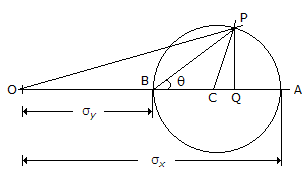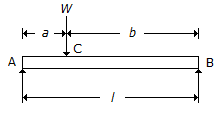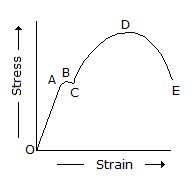Mechanical Engineering :: Strength of Materials
-
The strength of a riveted joint is equal to the
-
The neutral axis of the symmetrical beam does not pass through the centroid of the beam.
-
The Poisson's ratio for steel varies from
-
The deformation of a bar under its own weight is __________ the deformation, if the same body is subjected to a direct load equal to weight of the body.
-
A thick cylindrical shell having ro and ri as outer and inner radii, is subjected to an internal pressure (p). The minimum tangential stress at the outer surface of the shell is
-
In a simple bending theory, one of the assumption is that the plane sections before bending remain plane after bending. This assumption means that
-
The maximum shear stress, in the given figure, is equal to __________ of the Mohr's circle.

-
A simply supported beam of length l carries a point load W at a point C as shown in the below figure. The maximum deflection lies at

-
When a body is subjected to direct tensile stresses (σx and σy ) in two mutually perpendicular directions, accompanied by a simple shear stress τxy , then in Mohr's circle method, the circle radius is taken as


 Whatsapp
Whatsapp
 Facebook
Facebook










